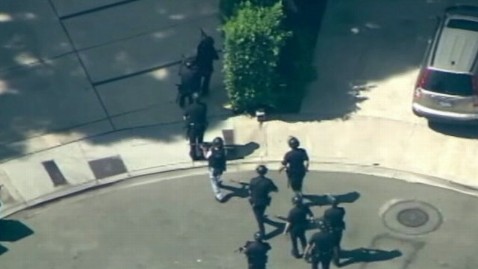Anti-'Swatting' Bill Moves Forward in California Legislature
LOS ANGELES - California lawmakers are moving to make perpetrators of "swatting" pay more for their crime, advancing a bill that would make those found guilty pay back police for the cost of responding to the fake 911 call.
The bill, put forward by state Sen. Ted Lieu, was approved today by the state Senate Public Safety Committee and could reach the Senate floor by June.
"What this would mean is if you were caught doing swatting, the existing law already authorizes jail time, my bill puts on top of that the judge could order the defendant to pay the full cost of the swatting incident," Lieu told ABC News.
According to Lieu, a swatting incident can cost up to $10,000. The prank 911 calls trigger the dispatch of Los Angeles police officers or a SWAT team to a celebrity's home. Yet when police arrive, they find no crime is being committed.
"They are mainly high-risk calls where they're in danger, they see weapons," Los Angeles Police spokeswoman Sally Nadera told ABC News. "It's a very dangerous situation for everyone, for the public and for the officers because they go and respond to these calls having the mindset they may encounter suspects."
Actor Russell Brand was the most recent victim, but over the past several weeks, Justin Timberlake, Selena Gomez and Rihanna were all hit. Lieu said the hoaxes have reached "near-epidemic proportions."
"It has dramatically increased in the last several weeks, swatting also affects non celebrities," Lieu said. "Just last week you had multiple swatting calls happen on one day to a range of celebrities."
While there have been more than 400 "swatting" calls nationwide, the prank has been mainly associated with celebrity homes. When Timberlake's home was targeted, a tour guide on a passing Hollywood tour bus had to explain to the passengers why police were present.
The hoaxes have become a nightmare for the LAPD, which has had difficulty tracking down the callers. Unable to tell which calls are real and which are hoaxes, officers have to respond as if each call is a real threat.
"We are very frustrated because it's definitely a waste of resources," Nadera said. "This is public money that is being used. Many officers are responding to these calls when they should be responding to where crimes are being committed."
Advanced technology has allowed those behind the crime to make it seem that the call is coming from a residence when in fact it's being placed somewhere else, Lieu said.
"The best way to solve this would be for the technology to catch up so law enforcement can track the perpetrator," he said. "Right now there's immense difficulty in being able to track who's doing this."
Nadera said the LAPD has started an investigation into who's committing the crimes, and those found responsible will most likely serve time.
"We have people who are doing serious investigation to get to the bottom of this," Nadera said. "If you're found guilty, you're going to pay the consequences. 911 is a number you dial when something serious is happening, not just because you're bored."

(ABC News)
While there are still concerns about putting swatting to an end, Lieu said he believes this is a step in the right direction.
"I think it will be a deterrent to mitigate swatting," he said. "I'm very pleased and this is a good step forward,"
The bill will now go through the state Senate Appropriations Committee, followed by the state Senate floor and Lieu said he hopes it will end up on the governor's desk by September.
"We need to mitigate this problem before someone gets injured or gets killed," he said.